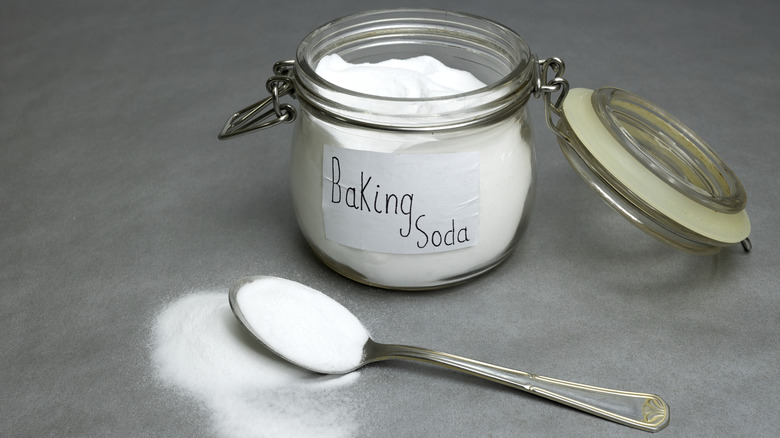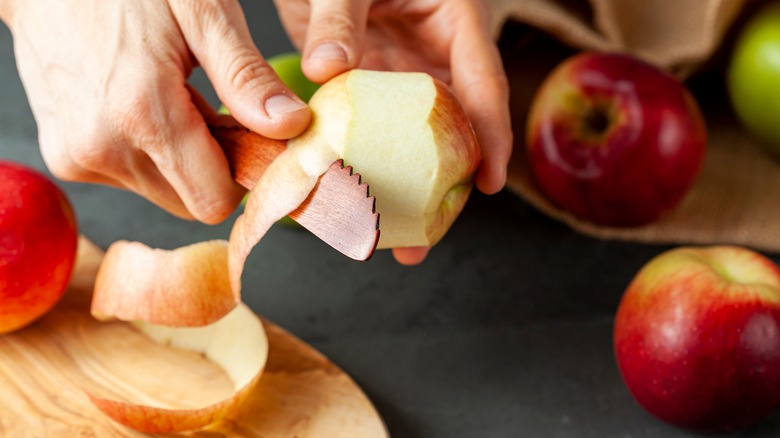Washing Apples In Baking Soda Gets Rid Of Pesticides — But There's A Catch
Remember the old saying, "An apple a day keeps the doctor away?" That may not be true if you're eating non-organic apples without washing them. They contain more pesticide residue than strawberries, nectarines, and some leafy greens, including kale and spinach.
Apples are treated with various chemicals, including diphenylamine, a compound that reduces scald damage. This substance keeps their skin from turning black or brown during storage, explains the Environmental Working Group (EWG). The problem is that it may promote the formation of nitrosamines, a class of chemicals linked to cancer. Unfortunately, washing apples is never 100% effective at removing the chemicals on their skin.
European officials banned the use of diphenylamine on fruits in 2012, but that's not the case in America. The Harvard T.H. Chan School of Public Health recommends washing apples with water and baking soda to remove pesticide residues. However, this step alone may not be enough to eliminate the chemicals in fresh produce.
Can baking soda remove pesticides from apples?
Baking soda, or sodium bicarbonate, is often used as a natural cleaning agent due to its ability to dissolve grease and other organic compounds. Moreover, it can double as mouthwash, deodorant, air freshener, and bathroom cleaning agent. Perhaps not surprisingly, this versatile ingredient can also remove pesticides from apples, suggests a 2017 study featured in the Journal of Agricultural and Food Chemistry.
Researchers applied the insecticide phosmet, along with a fungicide, to organic apples. After that, they placed the fruits in a solution of water and baking soda for 12 to 15 minutes. Some apples were immersed in water and bleach for two minutes. Next, scientists rinsed the fruits, allowed them to air dry at room temperature, and then analyzed their pesticide levels. The apples washed with sodium bicarbonate had fewer pesticide residues than those treated with bleach, but there were still some residues left in their peels.
Currently, there are no studies to support the use of baking soda for removing diphenylamine. Even so, this compound can break down most pesticides, allowing you to rinse them off more easily, says the Harvard T.H. Chan School of Public Health. Therefore, it may be effective against diphenylamine, too. Simply mix 1 teaspoon of baking soda with 2 cups of water in a large bowl, soak the fruits, and rinse them with tap water after 15 minutes or so. Let them dry before refrigerating.
Take this extra step to remove pesticide residues completely
Washing apples with baking soda can only remove the pesticide residues on their skin. If the chemicals have already penetrated the peel, you must go one step further to get rid of them. Your best bet is to peel the fruits and then rinse them again, although some pesticides can penetrate their flesh, too. The downside is that you'll miss out on a bunch of nutrients.
A medium apple with skin boasts more than 4 grams of fiber, 4 micrograms of vitamin K, 5.5 micrograms of folate, and 98.3 international units of vitamin A. By comparison, a peeled apple has only 2.8 grams of fiber, 1.3 micrograms of vitamin K, 4.3 international units of vitamin A, and no folate. Plus, it's significantly lower in lutein and zeaxanthin, two antioxidants that support eye health. The peel also contains large amounts of vitamin E, a fat-soluble compound with antioxidant, cardioprotective, and immune-supporting effects.
Basically, there's a trade-off when you peel apples. It can help limit your exposure to pesticides, but you'll get fewer nutrients. A better option is to purchase organically grown apples, which contain no pesticide residues. The same goes for celery, cucumbers, cherry tomatoes, grapes, peaches, and other foods you should only buy organic.


